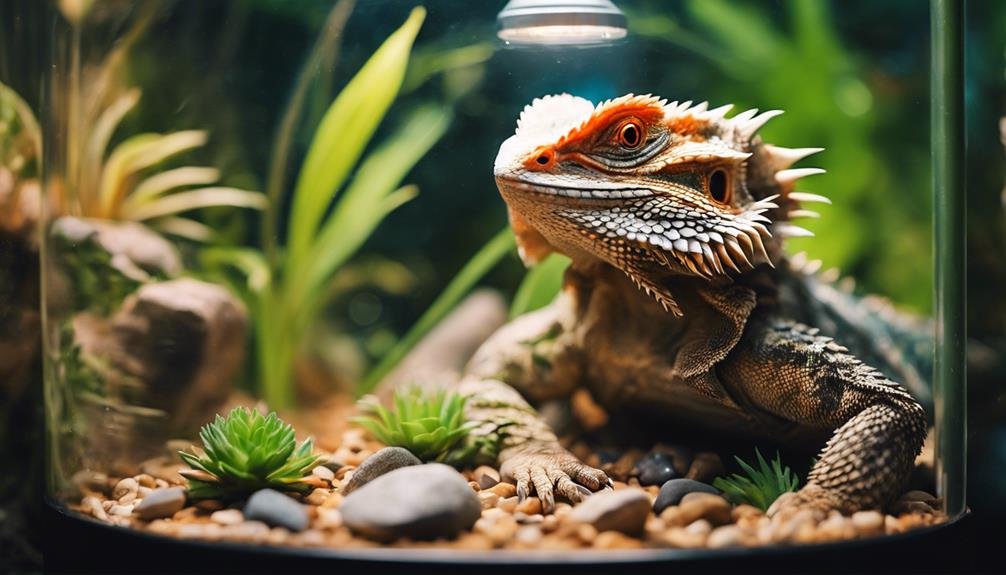If you’ve ever wondered how you can prolong the life of your bearded dragon beyond the average 8 to 12 years, you’re not alone. Many owners don’t realize that the longevity of these fascinating reptiles heavily depends on factors such as diet, UVB exposure, and habitat conditions. You might be surprised to learn that certain adjustments in their care can potentially add years to their life. But what exactly are these adjustments, and how can you implement them to guarantee your bearded dragon thrives? Stick around, and you’ll discover some secrets to revealing a long, healthy life for your scaly friend.
Key Takeaways
- Bearded dragons in captivity can live 8 to 12 years with proper care.
- UVB exposure is essential for bone health and preventing metabolic bone disease.
- A balanced diet with leafy greens, vegetables, and gut-loaded insects boosts longevity.
- Maintaining optimal habitat conditions, including appropriate temperatures and humidity, supports health.
- Regular health check-ups and stress reduction techniques contribute to a longer, healthier life.
Average Lifespan Overview
On average, bearded dragons in captivity live between 8 to 12 years, though this can vary based on care and environmental factors. When you’re delving into dragon care, understanding the lifespan of these creatures is essential. Unlike their wild counterparts, which often face a shorter lifespan of 5 to 8 years due to predation and harsh environmental conditions, bearded dragons in the safety of your home have the potential for a longer, healthier life.
The secret to ensuring your bearded dragon lives a long and happy life involves more than just providing a tank and some food. Proper husbandry is key; this includes a diet that meets their nutritional needs, appropriate lighting to mimic their natural habitat, and a well-structured habitat that allows them to thrive. Female bearded dragons might live slightly shorter lives, a fact attributed to the strain of egg-laying.
Interestingly, the record for the oldest pet bearded dragon stands at 18 years and 237 days, showcasing the significant impact that excellent dragon care can have on their lifespan. So, as you commence on the journey of bearded dragon ownership, remember that the quality of care you provide directly influences how long your bearded dragon lives.
Key Factors for Longevity
Understanding the key factors that influence a bearded dragon’s longevity is essential for any owner aiming to maximize their pet’s lifespan. Proper care is the cornerstone of extending your bearded dragon’s life to an impressive 7-12 years, or even beyond, as demonstrated by the oldest recorded pet bearded dragon living up to 18 years and 237 days. This level of care encompasses several critical aspects, ranging from ensuring adequate UVB exposure to maintaining appropriate basking temperatures and providing a spacious tank.
Female bearded dragons may face a shorter lifespan due to the risks associated with egg-laying, highlighting the importance of specific care requirements for different genders. While wild bearded dragons in Australia typically live only 4-8 years due to predators and environmental challenges, captive ones can thrive and live much longer with the right conditions.
Here’s a quick glance at some of the key factors for longevity:
| Factor | Why it’s Important |
|---|---|
| UVB Exposure | Essential for bone health |
| Basking Temperatures | Critical for digestion and metabolism |
| Tank Size | Prevents stress, allows for exercise |
Proper Diet Essentials
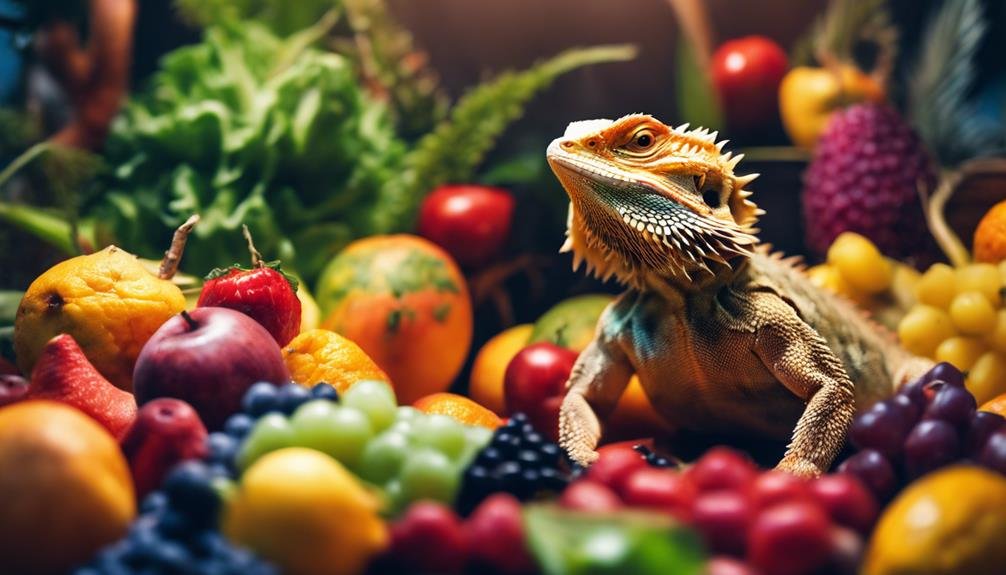

To guarantee your bearded dragon thrives, you’ll need to focus on a balanced nutritional intake that includes a mix of staple diet items and supplemental feeding practices.
You must carefully select leafy greens, vegetables, and insects, and remember to dust the insects with calcium to prevent health issues.
Avoiding toxic foods and ensuring proper hydration are also key steps in maintaining your pet’s health.
Balanced Nutritional Intake
Ensuring your bearded dragon receives a balanced diet, rich in leafy greens, vegetables, and protein, is key to their health and longevity. This not only helps them live a fuller life but also enhances their ability to thrive under UVB rays, essential for their well-being.
Including a variety of insects in their diet, which should be gut-loaded and dusted with calcium, is necessary to prevent calcium deficiencies. Be vigilant in avoiding toxic foods like avocados and mushrooms, which can be harmful to their health.
Proper hydration alongside these nutritional practices is important. Regularly monitoring their weight, behavior, and health indicators allows you to catch any issues early, ensuring your bearded dragon maintains excellent health.
Staple Diet Items
A balanced diet, rich in leafy greens, vegetables, fruits, and protein-packed insects like crickets and Dubia roaches, is essential for your bearded dragon’s health and longevity. To make sure your beardie thrives, include:
- Leafy Greens and Vegetables: These should form the bulk of their diet, providing important nutrients.
- Fruits: Offer these in moderation as a treat due to their sugar content.
- Live Insects: Crickets, Dubia roaches, and mealworms are important for protein and calcium.
Supplemental Feeding Practices
Beyond selecting the right mix of leafy greens, vegetables, and insects, it is vital to focus on how these foods are prepared and supplemented for your bearded dragon’s diet. Properly gut-loading feeder insects with calcium supplements is necessary to stave off metabolic bone disease. You’ll need to steer clear of toxic foods like avocados and mushrooms, which pose health risks.
| Do | Don’t |
|---|---|
| Gut-load insects with calcium | Feed avocados or mushrooms |
| Include a variety of leafy greens | Ignore the need for vitamin D supplementation |
| Consult a vet for dietary advice | Stick to a monotonous diet |
| Monitor and adjust the diet | Overlook the signs of nutritional deficiencies |
| Provide vitamin D supplements | Neglect regular health check-ups |
Importance of UVB Light
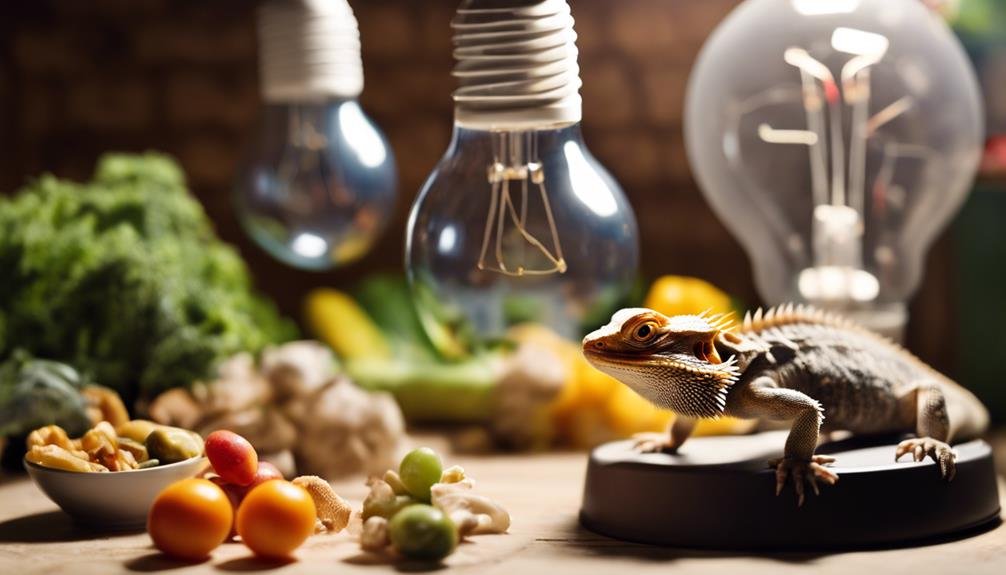

In order to maintain your bearded dragon’s health and prevent bone disease, it’s essential to provide them with adequate UVB light. UVB exposure is important not just for their well-being but for their very survival. This specialized type of light plays a pivotal role in their ability to metabolize calcium properly. Without it, your bearded dragon could suffer from metabolic bone disease, a condition that leads to weakened bones, deformities, and a host of other serious health issues.
Here are three key reasons why UVB light is indispensable for your bearded dragon:
- Calcium Absorption: UVB light enables bearded dragons to absorb and utilize calcium from their diet. This process is crucial for maintaining strong bones and preventing metabolic bone disease.
- Prevention of Bone Disease: Regular exposure to UVB light helps keep bone disease at bay, ensuring your bearded dragon stays healthy and active.
- Overall Health and Longevity: Proper UVB lighting supports not only the physical health of bearded dragons but also contributes to their growth and longevity.
Optimal Habitat Conditions
Creating the perfect home for your bearded dragon isn’t just about space; it’s also about managing the environment meticulously.
You’ll need to keep the temperature and humidity within specific ranges to mimic their natural habitat and keep them healthy.
Understanding temperature regulation necessities and ideal humidity levels is essential for their overall well-being.
Temperature Regulation Necessities
To guarantee your bearded dragon thrives, maintaining the terrarium’s temperature within the ideal range is essential. Here’s how you can ensure their habitat supports their health and longevity:
- Maintain the basking spot temperature between 95-105°F to aid in metabolism and digestion.
- Ensure UVB exposure to enable proper calcium absorption and metabolism, critical for their overall health.
- Create a temperature gradient from 75-85°F across the enclosure, allowing your bearded dragon to self-regulate their body temperature by moving between warmer and cooler areas.
Monitoring these conditions with accurate thermometers and adjusting your heating sources as necessary is key. This not only supports their physical health but also contributes to a longer, happier life for your bearded dragon.
Ideal Humidity Levels
After ensuring your bearded dragon’s terrarium maintains the right temperature, don’t overlook the importance of keeping humidity levels within the optimal range of 30% to 40%.
This critical spot is essential not only for their hydration but also for facilitating a smooth shedding process. High humidity can cause respiratory infections, while too low humidity might lead to skin problems.
To stay on top of this, you’ll want to use a digital hygrometer to accurately monitor humidity levels. Adjusting the humidity is straightforward – mist the terrarium with water or employ a reptile fogger when you need to bump up the moisture.
Regular Health Check-Ups
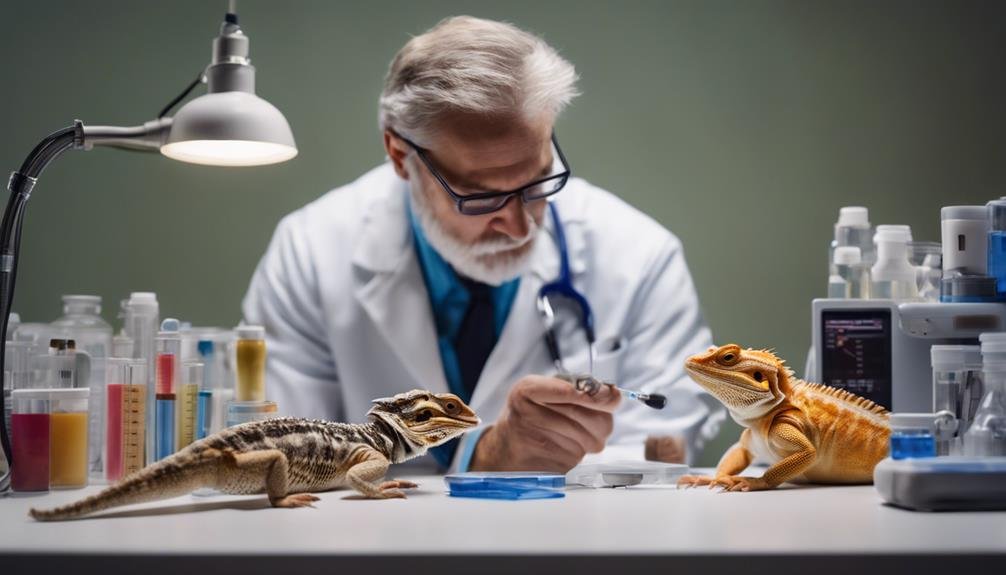

Ensuring your bearded dragon undergoes regular health check-ups is essential for its overall well-being. These veterinarian visits aren’t just imperative; they’re a vital part of your pet’s care that can lead to a longer, healthier life. By keeping up with regular check-ups, you’re taking a proactive step to monitor and maintain your bearded dragon’s health.
Here are three key reasons why these visits are invaluable:
- Early Detection of Illness: Veterinarian visits can spot early signs of health issues, allowing for timely intervention. This early detection is pivotal in managing conditions that could otherwise become serious.
- Diet, Behavior, and Habitat Consultation: Routine check-ups provide an opportunity to discuss your bearded dragon’s diet, behavior, and living conditions. This ensures that your pet isn’t only healthy but also happy and thriving in its environment.
- Tailored Care Recommendations: A reptile specialist can offer personalized care tips based on the health assessments of your bearded dragon. These recommendations can address any specific needs or concerns, ensuring your pet receives the best possible care.
Stress Reduction Techniques
Creating a comfortable living space for your bearded dragon is essential in reducing stress, which in turn can extend their lifespan.
You’ll find that regular handling and a consistent diet not only build trust but also guarantee they’re getting the right nutrition.
Optimal Habitat Setup
To enhance your bearded dragon’s health and reduce stress, start by setting up a spacious tank equipped with proper climbing and hiding structures. The right habitat setup is vital for their care, ensuring they thrive under your watch. Here are three key aspects to remember:
- Maintain proper temperatures and UVB exposure levels to mimic their natural habitat, essential for their physiological well-being.
- Use suitable substrate and decor to create a comfortable and stimulating environment, catering to their mental and physical health needs.
- Implement a consistent feeding schedule with a varied diet to meet nutritional requirements, necessary for their health.
Regular Handling Practices
After setting up an ideal habitat, it’s equally important to focus on regular handling practices to further reduce stress in your bearded dragon. Gentle and consistent handling not only guarantees your beardie enjoys a stress-free life but also paves the way for a strong bond between you two.
Start by introducing handling sessions gradually, in a calm environment to prevent startling your dragon. Handling techniques that avoid sudden movements and loud noises are vital. This way, you’re not only taking good care of your bearded dragon but also fostering trust.
Diet and Nutrition Balance
Maintaining your bearded dragon’s diet is crucial with leafy greens, vegetables, and gut-loaded insects to support their health and stress reduction. Bearded dragons require a variety of foods to thrive, not just for physical health but also to decrease stress levels which can affect their appetite and behavior.
To keep your pet happy and healthy, keep in mind these key points:
- Calcium and Vitamin Supplements: Be sure to incorporate these in their diet to prevent metabolic bone disease.
- Stress Reduction: Offer hiding spots and limit handling to help them feel secure and maintain a healthy appetite.
- Monitor Health: Watch for weight and behavior changes that may indicate a need for dietary adjustments.
Seeking guidance from a veterinarian for personalized dietary advice ensures your bearded dragon receives precisely what they need.
Common Health Concerns
Bearded dragons face several health concerns, including metabolic bone disease and dehydration, which can greatly impact their well-being. Metabolic bone disease, stemming from calcium deficiencies, is a common ailment that can lead to weakened bones, making your bearded dragon more susceptible to fractures and deformities.
Ensuring a balanced diet rich in calcium, supplemented with appropriate UV lighting, is important to prevent this condition.
Dehydration, on the other hand, can lead to serious shedding issues and even limb loss if not addressed. It’s important you provide your bearded dragon with enough water, either through direct drinking or a diet rich in moisture. Inadequate hydration is often a result of not just a lack of water but also insufficient bathing, which can exacerbate skin shedding problems.
Periodontal disease is another health concern that can affect your bearded dragon’s overall well-being. Poor oral hygiene can lead to this condition, highlighting the importance of regular mouth checks and cleanings. Ignoring these common health issues can shorten your bearded dragon’s lifespan, so it’s crucial to stay vigilant and proactive in their care.
Breeding Impact on Lifespan
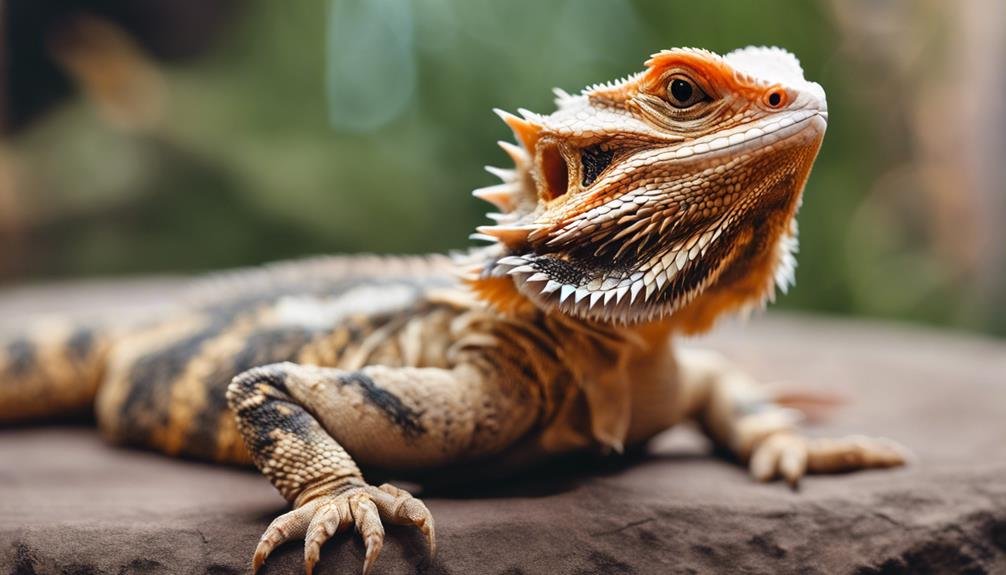

Understanding common health concerns lays the groundwork for recognizing how breeding impacts the lifespan of female bearded dragons. When you explore the world of bearded dragon care, one aspect that requires your attention is the breeding impact on these creatures, especially females. The strain of egg-laying can greatly affect their health and longevity.
Here are three critical points to remember:
- Responsible Breeding Practices: Adopting responsible breeding practices is essential. This means not overbreeding and ensuring that your female bearded dragons are in their best health before breeding. It’s about quality, not quantity, to preserve their health and lifespan.
- Consultation with a Reptile Vet: Before you decide to breed, consulting with a reptile vet can provide insights into how it might impact your bearded dragon’s lifespan. This step is important to prepare for and mitigate any potential health risks associated with breeding.
- Proper Care During Breeding: Providing proper care during the breeding process is crucial to minimize stress and maintain the overall well-being of the female bearded dragon. Stress and poor conditions can worsen the toll on her health, leading to a shortened lifespan.
Lifespan Extending Tips
To extend your bearded dragon’s lifespan beyond the average, focusing on proper care and environmental conditions is essential. Making sure your pet bearded dragon gets ample UVB exposure is vital for their health and longevity. This mimics their natural habitat and aids in vitamin D3 synthesis, essential for calcium absorption and bone health. Also, maintaining ideal basking temperatures within their enclosure promotes proper digestion and activity levels, contributing to their overall well-being.
The size of the tank plays a significant role in your bearded dragon’s happiness and stress levels. A cramped space can lead to stress, which decreases immunity and lifespan. As such, providing a spacious environment that allows for free movement is key to keeping your bearded dragon healthy.
Diet also has a significant impact on the lifespan of your bearded dragon. A balanced diet rich in vitamins and minerals supports growth, immune function, and longevity. Regularly offering a variety of greens, vegetables, and appropriate insects ensures your pet receives all the necessary nutrients.
What Is the Relationship Between Bearded Dragons’ Growth Rate and Their Lifespan?
The bearded dragon growth rates are directly linked to their lifespan. A healthy growth rate typically results in a longer lifespan for these reptiles. Proper nutrition, adequate lighting, and a suitable habitat all contribute to ensuring optimal growth rates and ultimately, a longer, healthier life for bearded dragons.
Frequently Asked Questions
Can a Bearded Dragon Live 20 Years?
Yes, a bearded dragon can live up to 20 years, but it’s rare. Your pet’s longevity hinges on several factors, including dietary habits, habitat design, and genetic factors.
By providing a balanced diet, ensuring proper UVB exposure, and creating a stress-free environment, you’re setting the stage for a longer life.
Don’t overlook the importance of regular vet visits to catch any issues early and keep your scaly friend in top shape.
What Is the Oldest Living Bearded Dragon?
You’re likely curious about the age records for bearded dragons; the oldest reached an impressive 18 years and 237 days. This milestone wasn’t just luck; key lifespan factors like excellent care practices played a significant role.
Ensuring they receive the right diet, environment, and regular vet visits can greatly extend their life. This example shows how dedicated attention to health needs can push the boundaries of their expected longevity.
Do Bearded Dragons Know They Are Loved?
You might wonder if your bearded dragon knows it’s loved. While they can’t process emotions like humans, they do respond to how you treat them. Proper handling techniques, environmental enrichment, and care show your affection in ways they understand.
They recognize consistent handling and a comfortable habitat as positive, but don’t equate this with love per se. It’s about creating a bond through routine and the right environment, rather than dragon emotions.
How Long Do Pet Bearded Dragons Live in Captivity?
Pet bearded dragons typically live 8-12 years in captivity. To achieve or even surpass this, you’ve got to nail their dietary needs, guarantee their habitat setup mimics their natural environment, and regularly engage in health monitoring.
Proper care, including a balanced diet, appropriate UV light exposure, and maintaining a clean, stress-free environment, greatly contributes to their longevity. Remember, their well-being directly impacts how long they’ll thrive under your care.
Conclusion
In sum, your bearded dragon’s lifespan hinges on the care you provide. Aiming for 8 to 12 years—or even more—is achievable with the right diet, UVB exposure, and a stress-free habitat. Address their needs diligently, from offering a balanced diet to creating an ideal living environment and minimizing stress.
Watch out for common health issues, and understand breeding’s impact. By following these tips, you’ll not only extend your pet’s life but also enhance its quality.

